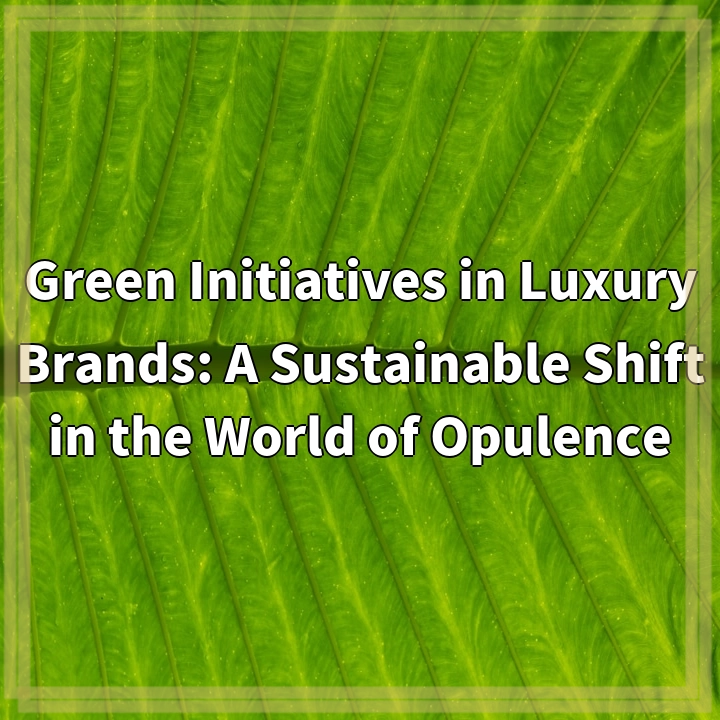Physical Address
304 North Cardinal St.
Dorchester Center, MA 02124
Physical Address
304 North Cardinal St.
Dorchester Center, MA 02124

Green initiatives in luxury brands refer to the collective efforts made by high-end and prestigious companies to incorporate sustainable practices into their operations. Luxury brands are traditionally associated with opulence and extravagance, but the increasing global concern for the environment has prompted these companies to become more conscious of their ecological footprint. They are recognizing the importance of embracing sustainable practices to reduce waste, conserve resources, and minimize their impact on the environment.
While luxury brands are making strides towards sustainability, several challenges still persist in their journey towards a greener future. One of the major concerns is the use of materials. Luxury items often rely on exotic animal skins, furs, and rare woods, which can lead to environmental exploitation and habitat destruction. The sourcing and extraction of these materials pose ethical questions and sustainability challenges for luxury brands.
Another problem lies in the production processes of luxury goods. The energy-intensive manufacturing practices and excessive packaging contribute to carbon emissions and waste generation. Furthermore, the supply chain complexity of luxury brands, with multiple suppliers and subcontractors, makes it challenging to track and ensure sustainable practices throughout the entire production process.
Consumer behavior also presents a hurdle for luxury brands adopting green initiatives. The perception of luxury has historically been associated with exclusivity and indulgence, leading to a mindset that sustainability equates to compromise or a lower perceived value. Educating consumers and changing their mindset to appreciate sustainable luxury is an ongoing challenge for brands looking to incorporate green practices.
Lastly, luxury brands face the issue of transparency and authenticity. Claims of sustainability can sometimes be misleading or exaggerated, known as “greenwashing.” This poses a problem of credibility and trust within the industry. Consumers are becoming more discerning and demand honest and verifiable sustainability practices from luxury brands.
1. Material Sourcing:
Luxury brands can promote sustainability by transitioning to alternative materials that do not harm the environment or wildlife. This includes exploring innovative options like lab-grown diamonds, cruelty-free fabrics, and recycled or upcycled materials. By prioritizing ethical sourcing practices, luxury brands can minimize their negative impact on ecosystems and biodiversity.
2. Sustainable Production:
Luxury brands should prioritize energy-efficient production processes and reduce waste generation. Adopting renewable energy sources, implementing circular economy principles, and optimizing logistics and packaging can significantly reduce carbon emissions and environmental footprint. By streamlining their supply chains and collaborating with sustainability-focused partners, luxury brands can ensure more sustainable production practices.
3. Shifting Consumer Mindset:
Luxury brands need to educate and engage consumers about the value and desirability of sustainable luxury. Emphasizing the craftsmanship, quality, and timeless appeal of eco-friendly products can challenge the notion that sustainability compromises luxury. Effective marketing campaigns, collaborations with influencers and sustainability advocates, and transparent communication about sustainability efforts can help change consumer perceptions and preferences.
4. Transparency and Certification:
Luxury brands should invest in transparency and third-party certifications to ensure credibility in their sustainability claims. Independent audits and certifications can reassure consumers that the brand’s green initiatives are genuine and meet established standards. By embracing transparency, luxury brands can build trust and loyalty with environmentally-conscious consumers.
5. Collaboration and Advocacy:
Luxury brands can collaborate with each other, environmental organizations, and industry associations to drive collective sustainability efforts. By sharing best practices, supporting research initiatives, and advocating for stronger environmental regulations, luxury brands can contribute to systemic change within the industry. Collaboration enables knowledge exchange and fosters innovation in sustainable practices.
Addressing these real-world problems requires collaboration and innovation among luxury brands, consumers, and regulatory bodies. Despite the challenges, the increasing number of luxury brands embracing green initiatives signifies a positive and sustainable shift in the world of opulence.
Green Initiatives in Luxury Brands
If you’re wondering where the article came from!
#